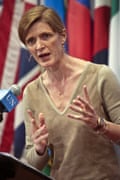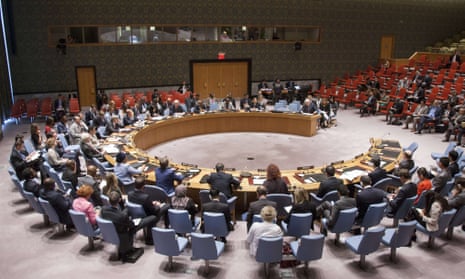The United States has warned that Russia’s continued blanket use of its UN veto will jeopardise the security council’s long-term legitimacy and could lead the US and like-minded countries to bypass it as a decision-making body.
The warning comes as the UN reaches its 70th anniversary and the security council faces a crisis caused by its paralysis over Syria. It has failed to agree concerted action to try to stem the bloodshed, even after more than 220,000 Syrians have died and more than 11 million have been forced from their homes.
Russia has used its veto powers four times to block resolutions on Syria that Moscow sees as damaging to its ally, the regime of Bashar al-Assad. It has also forestalled common action on Ukraine where it is a party to the conflict, having annexed Crimea and pursued a covert military campaign in support of eastern separatists.
Samantha Power, the US permanent representative to the UN, said that the US and other countries had increasingly been going elsewhere to have atrocities investigated, and that a “forum-shopping” trend was likely to continue.
“It’s a Darwinian universe here. If a particular body reveals itself to be dysfunctional, then people are going to go elsewhere,” Power told the Guardian. “And if that happened for more than Syria and Ukraine and you started to see across the board paralysis ... it would certainly jeopardise the security council’s status and credibility and its function as a go-to international security arbiter. It would definitely jeopardise that over time.”
Power was one of seven ambassadors to the UN who gave their views on the plight and future of the security council, at a time when it is being assailed on all sides, not just for its failures over Syria and Ukraine, but on broader and longer-term issues such as the fairness and relevance of its structure in the 21st century, and the veto rights of the five permanent members.

Matthew Rycroft, the British ambassador, said: “Syria is a stain on the conscience of the security council. I think it is the biggest failure in recent years, and it undoubtedly has consequences for the standing of the security council and indeed the United Nations as a whole.”
The US has used its veto three times in the past decade, to shield Israel from rebuke for its actions in the Palestinian territories. China has used six vetoes, each time in tandem with Russia, while Moscow has used its the veto 10 times over the same period. Since 1991, when Russia took over the Soviet seat on the council, it is the US that has been more prolific with its veto, using it 14 times (almost always to defend Israel from censure), compared to 13 Russian vetoes, and eight used by China.
The man with the job of voting ‘No’, Russia’s permanent representative, Vitaly Churkin, is unapologetic. He portrays the vetoes as aimed at protecting the security council’s integrity by preventing it from being used as a vehicle for toppling governments.
“Some countries were trying to involve the security council in regime change operations in Syria and we were telling them that it’s not the business of the security council to go into regime change mode,” Churkin said. “This is a fundamental difference and it’s not the fault of the security council that this difference is there.”
France is proposing that the five permanent council members (the US, Russia, France, UK and China) voluntarily suspend their veto rights in situations where genocide or other mass atrocities are being committed.
“Our initiative is based on the key and core conviction that veto power is not a privilege. It’s a responsibility,” the French ambassador, François Delattre, said.
The proposal has widespread support in the UN general assembly, but Russia adamantly opposes it. Churkin said it would be open to manipulation.
“I can easily see a situation in which there are some problems and then people start saying these are mass atrocities and there should be no veto and then propose something crazy that will lead to further exacerbating the situation,” the Russian ambassador said. “So under these circumstances we do not believe there is any need to tamper with the veto power.”
The current challenge to the security council’s authority goes deeper and further than the veto issue. The permanent five members appointed themselves in the aftermath of the second world war from which they emerged the victors. Seventy years on, that settlement is less representative than ever of the global distribution of population and economic strength. Emerging powers are knocking ever more assertively on the clubhouse door.
“In terms of its effectiveness, I think the United Nations security council in 2015 is much less effective than when it was set up in 1945,” Asoke Kumar Mukerji, India’s UN ambassador, said. “Part of the reason for it not being effective is because it does not really take on board the views of countries from the areas where disputes occur and the security council takes action.”
“There are entire regions of the world that are absent from the permanent member category,” Antonio Patriota, the Brazilian ambassador, said.
India, Brazil, Germany and Japan have collectively been pushing their claims for more than a decade. They also support permanent membership status for Africa, where the leading and most vocal current claimant is South Africa.

“It can’t be fair that the entire African continent is not represented in the security council. If you look at the discussions in the security council today, the discussions are about Africa really - 80, 85, 90% of the discussions,” said Kingsley Mamabolo, the South African permanent representative at the UN. “How can we have a situation in which other people are discussing what is happening on our continent without our participation?”
The barriers to expansion are formidable, however. France and the UK have voiced their support for a new intake of permanent members. “It’s time to see some changes to the way that the world’s reality is 2015 are reflected inside the security council,” said Rycroft, the British ambassador.
The other permanent members are more guarded, however. Power said the US was open to a limited expansion but cautioned: “[T]he ultimate legitimacy of the council comes as well from the effectiveness of the council… We’ve got to remember that any council reform is going to also have to enhance performance.”
That concern over the potential tradeoff between size and efficiency is something the US shares with Russia. Expansion would make the council more representative, Churkin conceded, but added that after spending nine and a half years in the security council he did not believe it would be more effective.
“If there are 25 or 27 members, of course it will be more difficult even to discuss issues and more difficult to reach a consensus solutions,” the Russian envoy said.
In New York, China has kept a lower profile in its opposition to change (the UN mission did not respond to interview requests) but it has been the most active behind the scenes in quashing any whiff of reform. Preventing Japanese permanent membership in particular is a longstanding strategic aim.
According to diplomats at the UN, Beijing lobbied African capitals to demand veto powers when Africa put forward a collective demand for two permanent seats, making it even less likely to be accepted. And when the Jamaican permanent representative, Courtenay Rattray, began making unexpected progress in drafting a text on reforms to put before the new general assembly session, China sent senior officials to Kingston to register disapproval.
The most surprising thing about the episode is that China felt it necessary to resort to such heavy-handed tactics. Under the UN charter, the only route to reform in the face of permanent five vetoes is to secure a two-thirds majority in the general assembly. But the non-member countries are themselves so divided as to make that a long shot. Jealous neighbours and regional rivalries of the leading candidate members have grouped together to block progress. The group started informally in 1995 as the “Coffee Club”, so named because the Italians did the hosting and provided the beverages, but it has since crystallised into a 13-nation lobby calling itself Uniting for Consensus.
Even if that bloc can be overcome, and a reform agenda attracts a two-thirds majority, the vote would have to be ratified by the legislatures of all those countries, as well as the parliaments of the permanent five. When the five created the council, they built a fortress with high walls.
“The sad reality is that serious changes to the security council are unlikely to happen in the next five to 10 years and the UN is going to have to muddle on with pretty much the same security council that it’s got right now,” said Richard Gowan, an expert on the UN at the European Council for Foreign Relations.
Hardeep Singh Puri, a former Indian permanent representative who is now vice-president of the International Peace Institute, argued that while the odds against change are daunting, a gamble on the part of the reformers, putting a concrete proposal before the general assembly in the knowledge it could well lose, could galvanise support from unexpected quarters. “If some countries shed the risk aversion of which they’re all guilty I think you could get a solution quite fast,” he argued.
In the absence of change, the consensus view (with the noticeable exception of Russia and China) is that the security council will lose legitimacy, and at a substantial rate as long as it remains impotent in the face of the Syrian disaster.

Comments (…)
Sign in or create your Guardian account to join the discussion